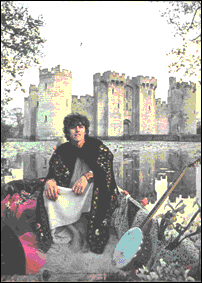
Q. What the hell is a hurdy gurdy man?
A. Picture pink tights, shawls and flowers? Well, think again, he might just be the studliest man you know...
okay, studly in a different way... like lover-of-fancy, seducer man... Anyway, here's the important stuff to know, in this day and age, about "troubadours":
Q. What's all this about, from where did this troubadour dude come?
A. Over hills and yonder valley, the path of the troubador has wandered. Strumming his lute, lyre, or air guitar, this minstrel of sorts has traversed a varied and vibrant terrain. Throughout history, the troubadour has been a dreamer...(11th-13th century Southern France and Northern Italy would be the technically correct response, but we're going for flow here.)
Q. So who is this mythical figure, to many unbeknownst? Tell me a little bit about the social climate that fostered him?
A. The tale of the troubadour is hazy, to say the least. The clearest picture of him arises during the Medievil Ages, the age of courtly love. Chivalry was the code of conduct for (intimate) relations among the courtly class(knights, kings, queens, etc.). Damsels were paired with suitors of an equally appropriate class; regardless of their desires; free-will in love was unheard. Marriage was pure economics, not even fully encouraged by the early Church. Weddings were a means to merge property and status of the wealthy classes, a means to preserve their estates and lineage.
It wasn't the merriest picture... The role of the trobadour was in some ways to ease this unrest and yearning felt by the courtly damsels. It is here that the troubador enters to serenade the maidens with sonnets, songs, and verse of undying admiration, devotion, and all the high, pure ideals of courtly love. Not exactly the "hot and bothered" kind of deal; we're talking about subtlety and seduction.
Q. And what, pray thee, hath he to say? What passions spur this figure in his perpetual woo?
A. Troubadours were nomadic poet-musicians--if you will. They roamed from court to court lyricly serenading women. For many, it was a means to make a living. It was not the same as being a mere street minstrel. The troubadour's trade was refined and elegant, tailored to the educated, rich, and emotionaly surpressed upper-class. He had to be enchanting yet reserved, charming yet forever unrequited.
Q. Why does he sniff flowers with longing?
A. *Sometimes they were unics--to further insure that, though the men had their mistresses and cortisans, the women of the court would always retain their honor. That is to say, according to ideals of courtly love, they wern't getting any--especially with a queen.
Q. How has he survived? Roaming from court to court, his passions, his love-- forever unrequited...
A. Well, the troubadour, though by-and-large now extinct, has remained in modified ways. The 1960's saw a real troubadour revival, only serenading different ideals. Instead of courtly love, new troubadours wrote lyrical verse to save their fair land, to honor his sisters and brothers, and to protest war. By and large, many of these longings go unrequited, just as the choice of love in the Medieval Ages.
Q. Okay, so now I'm seeing what you're getting at...any suggestions of 20th Century "troubs" to check out?
A. Well, the 1960's flourished with them. As in the 11th-13th century, many go unrecorded.
But since you asked, here's my Top 3 Late Twentieth Century Troubadours, in order of thier appearances on our planet blue:
DONOVAN--the Sunshine Superman himself...supreme and still accessable, with such lilting tunes. He ponders the landscape with such lyrical panache, it brings a tear to my eye "..color of the sky, prussian blue...crimson ball sinks from view...wear your love like heaven...". He addresses the political climate of his era in "Season of the Witch", and provides meditations of self and saviors, "Hurdy Gurdy Man." he even goes Zen with the refrain of, "...first there is a mountain, then there is no mountain, then there is." Not to be missed, even if you just get a best of album...
YES. That's right, nobody's spoken favorite, but you can all sing along... True to the outcast troubadour motif, YES is always ouside the limits. Musings include real 20th Century unrequited issues like space navigation in "Starship Troopers", creation, god, and science in Tales From Topographic Oceans, and daily life in "Long Distance Runaround". Always elaborately simple...not often a love returned
BECK. Troubadour to the Late 20th Century, indeed. He said farewell to it all in the perfectly timed Mutations album, "The End of the End". (also note a strong connection between this album and Donovan's style) In general, a true troubadour to the new codes of the era--computers, Ozzy, Nicotine and Gravy, celophane chests, and Midnite Vultures...all the mysique of modern life and its jargon is here with intelligence and wit. His muse is the incongruency of our times, sure to go unrequited...
(*This question might fall a little beside the point. To the real troubladour, a response might as likely be, "...because.", more than anything else.)
